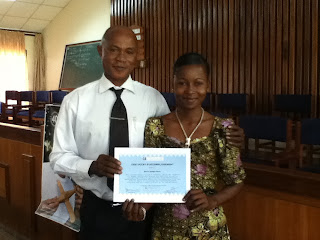Sunday, March 4, 2012
Eustache Ilunga, is the Director of the Employment Resource Center for the Church in DR Congo. He is one of our very good friends, and also our Stake President. He is very forward thinking and always looking for ways to help people become employed and self-reliant.
A year and a half ago, in working with one of the local stakes, he and that stake president approached a local micro-bank about how they might make micro-loans to members who had small businesses. Now, a small business in the DR Congo consists of selling goods or services along the roadside.
These are typical street scenes with people selling from baskets on their heads and small "boutiques" of people sitting on the side of the road selling things. The buildings in the background are real stores.
Now, over a year and a half ago, these twenty people have received loans and paid them back with interest and most of their businesses are doing well.
A few month ago, due largely to the success of the this micro-loan experiment, the Church sent people over from Salt Lake to expand a pilot program that is being used in South America. The two originators of the concept, were two guys who had done well in business and retired early. They were bored and collaborated on a program for the Church to teach business principles centered on self-reliance. We were invited to attend the initial training program. It was really well done and generated a good deal of enthusiasm among the pilot group.
Photo of the initial training of priesthood leaders for the project. Priesthood leaders and mentors were selected to teach and mentor each of the groups. Each team had a mentor who taught them, using the prepared materials.
The program model is to find success in three basic areas. Their business, their home, and their community. By enlarging the model to include the family and the community, the effort does more than business, it improves their families and the community becomes better because the business people look outward. Creating cleaner, safer, and more friendly neighborhoods. The materials are really well done and allow mentors and leaders to quickly become good teachers.
Two stakes were chosen to pilot the program - Ngalema and Kimbanseke. The model used was that which has been successful with the global micro loan experience. Groups/teams of five were established. Each member of the team had a different business, but they learned and worked in concert. They formed, in effect, support groups. Each group meeting weekly to encourage and hold accountable the other members of the group. At the same time, the employment resource center (ERC) continued to teach and mentor.
Saturday, we were invited to the graduation ceremony for the Ngalema stake. About 30 people received certificates of graduation. Two sisters bore testimony of how the training, the program, and their team members had increased their success in the three areas of emphasis - their business, their home, and their community. A group of sisters who graduated from the program.
The Ngalema stake president spoke and reminded the participants that the diploma was only the start, that they should continue in their efforts.
Also, three mciro-banks were invited. The one that made the initial loans to the 25 people from masina reported that these twenty five were the model of excellence. They had faithfully repaid the loans and had were continuing to improve their businesses. He stated that his bank would encourage other members of the the Church to visit his bank. The two other banks that were invited seemed very eager to have this new group as customers.
most of the participants were women. This seems consistent with what I have read concerning micro banking and third world entrepreneurs. Leslie Tunks turned us onto a great book Banker to the Poor by Mohammad Yunus. The woman pictured above has started smoking fish and selling them along side the road, another took advantage of the Church's Relief Society sewing classes, and makes clothing. As you will note all of the women had on beautiful Congolese dresses. One couple has a "play station location where they rent computer and play station to kids. Another sold bread, one made small cakes and sold them.The Play Station Couple
These kinds of programs are sorely needed in the DR Congo. The graduates were singing and dancing and very proud of themselves. They had accomplished a good thing. They were fighting poverty at its very core, unemployment. We are glad to belong to a Church that does so much for its people.
Subscribe to:
Comments (Atom)









